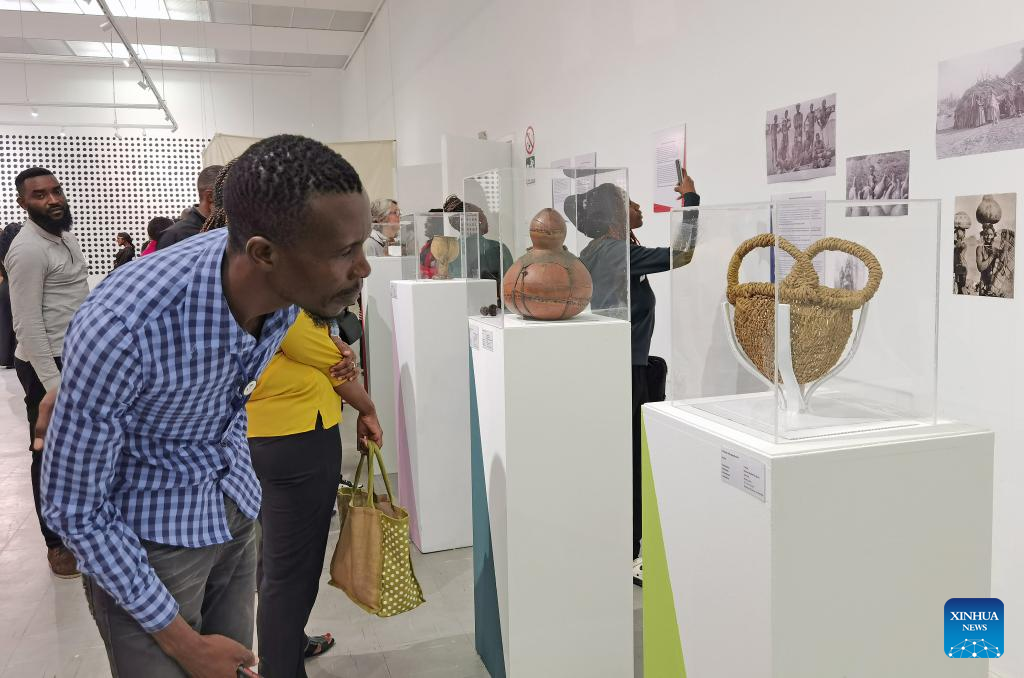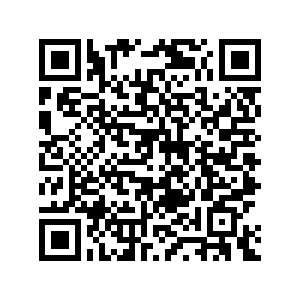
Visitors view exhibits at an exhibition themed "Artistic Research Communal Knowledge (ARCK): Reconnecting with Returned Cultural Belongings" in Windhoek, Namibia, on April 11, 2024. Namibia opened the exhibition here Thursday evening dedicated to exploring the cultural customs and identity of the country's looted art to retrieve its heritage. (Photo by Ndalimpinga Iita/Xinhua)
WINDHOEK, April 12 (Xinhua) -- Namibia opened an exhibition in the Namibian capital of Windhoek Thursday evening dedicated to exploring the cultural customs and identity of the country's looted art to retrieve its heritage.
The exhibition, themed "Artistic Research Communal Knowledge (ARCK): Reconnecting with Returned Cultural Belongings," features 23 cultural and historical belongings that were returned from the Ethnological Museum, a public institution dedicated to ethnology and culture in Berlin, Germany, to Namibia in May 2022.
The artifacts, including milk gourds, calabash, woven baskets, and traditional wooden cups, will be displayed at the National Art Gallery of Namibia in Windhoek, the capital of Namibia, until May 18, 2024.
Beverly van Wyk, an official from the Museum Associations of Namibia, said the 23 artifacts were selected for the project from more than 9,000-strong collections in the National Museum of Namibia Anthropology department based on cultural and spiritual significance.
"Furthermore, we used criteria of a rarity in Namibia today, aesthetic uniqueness, fragility, and other technical aspects in selecting the artifacts for this project," she said.
Opening the exhibition, Sanet Steenkamp, executive director for the Ministry of Education, Arts, and Culture, said the exhibition follows collaborative research conducted by local artists, researchers, and communities to reactivate knowledge and skills related to historical belongings.
The artists used the knowledge they gathered and represented it in various artistic mediums such as poetry, performance, and sculpture, contributing to the ongoing dialogue about cultural heritage in Namibia.
"Ultimately, this collaborative research and creation process highlights the importance of understanding, sharing, caring, and developing further cultural heritage to create a better future," she said.
The exhibition and ARCK project also aim to address and rectify the gaps in Namibia's history and cultural heritage caused by colonization by the German Empire (1884-1915) and South Africa (1915-1990).
Meanwhile, the exhibition can spark debate on art presentation and repatriation.
According to Golda Ha-Eiros, a senior National Museum of Namibia curator, curating this work is a captivating and altruistic journey through time.
"Through unveiling the stories that have shaped our artistic and cultural heritage, this exhibition invites us to connect with the rich histories of our people that lie beneath the surface of each cultural belonging," she said.
In addition to the exhibition, educational programs such as panel discussions, workshops, and guided tours will be held aimed at enhancing the public's understanding of artistic research and communal knowledge and their role in preserving Namibian cultural heritage.
The project ought to bring home cultural belongings from the Ethnological Museum's almost 14,000 cultural belongings identified as originating from Namibia. ■

Visitors view exhibits at an exhibition themed "Artistic Research Communal Knowledge (ARCK): Reconnecting with Returned Cultural Belongings" in Windhoek, Namibia, on April 11, 2024. Namibia opened the exhibition here Thursday evening dedicated to exploring the cultural customs and identity of the country's looted art to retrieve its heritage. (Photo by Ndalimpinga Iita/Xinhua)
